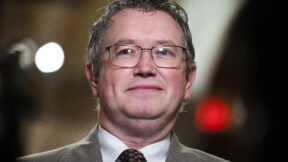Log Cabin Republicans President Defends ‘Don’t Say Gay’ Bill: Democrats Are Trying to ‘Stir Up a Culture War’
In an interview with Mediaite at the Conservative Political Action Conference (CPAC) in Orlando, Florida, Log Cabin Republicans President Charles Moran defended Florida House Bill 1557, the Parental Rights in Education bill (aka the “Don’t Say Gay” bill). He noted his organization’s involvement in defeating a controversial amendment but also argued that many of the criticisms were inaccurately portraying the legislation’s actual current language.
It has been quite an evolution for LGBTQ Republicans at CPAC in just over a decade. In 2010, social conservative groups like the Family Research Council boycotted CPAC because GOProud, a now-defunct LGBTQ organization, was invited. The board of the American Conservative Union (the group that holds the CPAC event) voted to not allow GOProud to sponsor the conference in both 2012 and 2013. Whether or not to allow LGBTQ groups to even pay for a booth in the exhibition hall was a highly contentious debate for several years.
But the furor faded, and in 2016 — the year after the Obergefell Supreme Court opinion — the Log Cabin Republicans were a CPAC sponsor for the first time.
By 2022, the Log Cabin booth was just yet another table with pamphlets, buttons, and a jar of candy (walking through the exhibition hall is a bit like trick-or-treating, with the booths setting out jars of mints and bite-size chocolates, plus various flyers, buttons, stickers, beer koozies, and other swag to pick up).
Moran told me that his organization had been following HB 1557 throughout the session, and sent me several links for past articles they had published that pushed back on some of the liberal critiques of the bill.
“What this bill would do would prevent the discussion of the sexual orientation, gender identity, conversations from the ages of three years old to third grade, which is about seven to eight years old” by preventing school districts from “adopting curriculum that’s going to encourage conversations around this area,” said Moran.
Both gay and straight parents, in his view, would agree that this third-grade-and-under group was “entirely too young of an age bracket to be having these types of very adult and very complex conversations around sexual orientation and gender, specifically gender identity issues…this is not an appropriate subject matter [to be] teaching at that time.”
(I previously interviewed Florida State Rep. Anthony Sabatini (R) about HB 1557, and he says it should ban these issues from being in the curriculum at all age levels — a position that seems highly unlikely to win support in the final weeks of Florida’s legislative session, even with GOP majorities in both the House and Senate.)
Moran’s organization disagreed with liberal groups that portrayed the bill as “banning discussions” from ever happening, pointing to the language of the bill to say it was limited to regulating the formal curriculum.
“If there are opportunities or moments where the subject matter comes up in class,” said Moran, the bill “doesn’t prohibit the conversation from happening.” Instead, he continued, “it prevents the school from building this into curriculums and having some sort of forced conversation about it…We think that that’s not an undue measure of restriction.”
I asked Moran about a controversial amendment that was briefly part of the bill, one that was loudly denounced by critics for its overly vague language that many feared would legally require schools to out LGBT students. After several days of backlash, the bill’s sponsor, Florida State Rep. Joe Harding (R), withdrew the amendment.
The Log Cabin Republicans got involved “very early” when they heard about this amendment, said Moran, getting on the phone “immediately” with Harding, the author of both the amendment and the original bill.
Moran touted how the Log Cabin Republicans, as “a coalition of LGBT Republicans and conservatives and our allies, were able to get that access,” and praised Harding for being “very open to speaking with us very quickly.” The conservative lawmaker “absolutely welcomed our conversation to hear our perspective,” Moran continued, and “addressed our concerns.”
“And ultimately, as a result of some other conversations and ours, the amendment was pulled,” he said. “So that’s the type of engagement we like to have to help steer the conversation in the right way.”
I asked for his response to a key concern from the bills’ critics, that it would restrict teachers from talking about their own families if they’re in a gay marriage, or prevent students from talking about their own family members.
Moran acknowledged that was a possibility with the now-deleted amendment, but one that “does not exist” with the current version of the bill, so the criticisms voiced by people like Chasten Buttigieg, husband of Secretary of Transportation Pete Buttigieg, were unfounded.
“The current version of the bill does not prohibit conversations,” Moran emphasized, mentioning again the limited curriculum focus and age bracket of age 3 to grade 3.
Therefore, he continued, “even at that very young age,” such topics could still be discussed, but schools just cannot be “building it into curriculum and bringing it up like, let’s talk about this as part of today’s lesson plan.”
“So the criticisms that have been launched don’t have any kind of validity to the actual bill [and] its current language.”
Moran described his work as the organization’s national president as generally focused on national issues, but with over 80 chapters in 40 states, they encourage their local chapters to keep an eye out for relevant legislation to engage with local and state officials to make sure that “our very distinct voice is articulated” in the process.
They were continuing to monitor HB 1557 as it was debated in the Senate this week, he said, watching for any possible hostile or friendly amendments.
Moran questioned the motivations of the progressive movement in their focus on this state-level legislation. “The fact that a bill this benign has prompted a response from the White House, from the Secretary of Transportation. I’m wondering, is this a distraction that they’re using?” he pondered.
“Again, this is a state bill. They have a total misread of it… is this just a distraction to try to stir up a culture war to paint Republicans as being anti-gay or anti-trans?”
He framed the controversy as a “boogeyman issue” to try and pit the gay community against the Republican Party, and noted research done by The New York Times that said that almost one-third of the LGBTQ community had voted for former President Donald Trump in the 2020 election.
“I think that the Left realizes that they’re losing this war,” said Moran, “so stirring up this type of controversy is really bolstering the Democrats’ sinking electoral prospects for the 2022 election.”
School choice and parental rights issues had brought a lot of “energy and enthusiasm” to recent elections, Moran concluded. “It was extremely impactful” in GOP victories in Virginia, and he was “going to be really looking forward to seeing what happens here in Florida…and how this kind of changes the landscape about the way the parents are engaging with their local government.”
Watch above. Video by Sarah Rumpf for Mediaite.
Follow Mediaite’s CPAC 2022 coverage here.
New: The Mediaite One-Sheet "Newsletter of Newsletters"
Your daily summary and analysis of what the many, many media newsletters are saying and reporting. Subscribe now!






Comments
↓ Scroll down for comments ↓